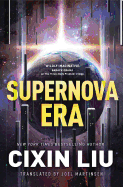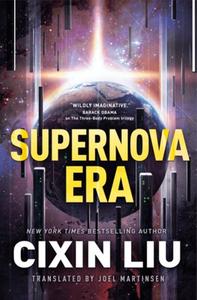
 Newly translated from Chinese, this science fiction parable by Hugo winner Cixin Liu (The Three-Body Problem, Ball Lightning) imagines a world in which the children become the future much sooner than anyone anticipated.
Newly translated from Chinese, this science fiction parable by Hugo winner Cixin Liu (The Three-Body Problem, Ball Lightning) imagines a world in which the children become the future much sooner than anyone anticipated.
The Earth's Common Era ends with the death of a faraway star. Its explosion turns the twilight bright as midday, makes human beings phosphoresce and leaves behind a new nebula. Despite the wonder in its wake, the Dead Star also wreaks havoc. Its radiation kills the cosmonauts aboard the Mir in a matter of hours, but the prognosis for life on Earth is more complicated. While children under 13 will survive the effects of the widespread radiation poisoning, their elders will not. Within one year, the Earth will be a planet of children.
Around the world, governments hold various selection trials to choose Earth's new leaders. In Beijing, Specs, Huahua and Xiaomeng become the heirs apparent to China's government, even though they just graduated from middle school. Adults across the nation labor tirelessly to train their children as fighter pilots and childcare providers for the infant survivors, and they build a store of resources to sustain a new society the adults envision as identical to their own.
When the changeover of power occurs, though, the children of China are more interested in turning part of their country into a giant amusement park than in re-creating the old world order. As the three teen leaders struggle to corral a nation of first panicked and then defiant younger children, bigger trouble brews across the sea in the United States, where unlimited access to weapons has spawned deadly games of soldiers.
Conceived as an allegory for the Chinese citizenry's reaction to a rapidly modernizing society, Liu's post-apocalyptic vision is written as a semi-fictionalized historical account. Because of this structure, character development takes a backseat to sometimes didactic overviews of geopolitical events. However, Liu shows real mastery of his concept, from the children's stages of grief and wonder to their inevitable human desire to conquer. He also orchestrates the evolution of the youth-led countries and the global political scene believably, channeling all the ambition, self-centeredness and happy, dangerous ignorance of childhood.
The U.S. plays the closest role to villain, and the imperialist attitudes, rampant gun problems and divisive leaders portrayed in the story seem to satirize current events. However, Liu wrote Supernova Era in 1989, a surprising bit of trivia considering how well he anticipated digital technology's development. With Martinsen's translation, this audacious and ultimately optimistic early work will give Liu's English-reading fans a glimpse at his evolution as a writer and give any speculative fiction reader food for deep thought. --Jaclyn Fulwood, blogger at Infinite Reads
Shelf Talker: When a star eight light years away goes supernova, the radiation kills Earth's adult population and leaves its children to start a world of their own.

